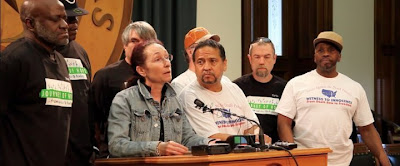From the Fort Worth Star Telegram:
Conclusions made by arson investigators in the Corsicana case that ended with a man’s execution were wrong by today’s standards, Tarrant County Medical Examiner Nizam Peerwani said Friday.
But whether there is enough evidence to conclude that Cameron Todd Willingham was guilty or not guilty of killing his three daughters in 1991 is a question for the courts to decide, Peerwani said during a seminar at the Texas Wesleyan law school.
Peerwani, appointed by Gov. Rick Perry in December to the state Forensic Science Commission, ticked off flaws in the arson report that helped lead to Willingham’s conviction and execution.
Among them, he said, investigators were wrong to conclude that the fire that swept Willingham’s home had multiple starting points and that patterns indicated that an accelerant had been used, Peerwani said. By current standards of science, none of things that the arson investigators cited indicate arson, he said. But standards in the early ’90s were evolving, he said.The forensic science commission is scheduled to meet in November to review the arson investigation.
“Texas is home to more verified wrongful convictions than any other state in the nation,” Peerwani said.
It is good, then, that the criminal justice system is willing to admit and correct mistakes, he said.
“It means the system is working,” he said.Peerwani’s speech was one session at the seminar, Innocence and the Road to Exoneration.
Mike Ware, head of the Dallas County Conviction Integrity Unit, specialists from the Innocence Project and legal professors from across the country discussed issues contributing to the estimated 1 to 3 percent of people under the control of the justice system who are wrongfully convicted.Four of the more than two dozen people who have been exonerated in cases from Dallas County also spoke.
Contradictory testimony
Willingham was accused of setting the fire that killed his daughters — 2-year-old Amber and 1-year-old twins Karmon and Kameron — on Dec. 23, 1991, but he maintained his innocence, including in a Death Row interview with The Associated Press shortly before his execution in 2004.
Willingham was home alone with the children after his now ex-wife, Stacy Kuykendall, left for work. He was asleep, he testified, but was awakened by Amber’s cries and saw smoke pouring through the house. Willingham said he groped through the smoke, trying, without success, to find his children as burning debris fell. He found the front door and escaped.
Authorities later said Willingham gave inconsistent accounts of what happened. Also, fire investigators concluded that accelerant was splashed on the floor and near the doorsill, presumably to block rescue attempts.
Peerwani questioned how much credence should have been given to an inmate who heard Willingham say he burned his children by dousing one of their arms and the area around her with lighter fluid and then setting fire to the fluid.
Also, Peerwani questioned the value of contradictory eyewitness testimony from neighbors. Some said Willingham did not seem sufficiently upset by the deaths. He never tried to rescue his daughters and was more concerned about his car burning up than about them, some neighbors said.
Other witnesses said Willingham was so distraught that he had to be restrained from trying to enter the house.Peerwani’s observations were only a few in a parade of flawed cases discussed during the seminar. Several scholars outlined structural deficiencies in the legal system that they considered impediments to reaching sound verdicts.
Mark Godsey, a University of Cincinnati law professor, said he has seen juries so swayed by expert testimony from the state that they overlook opposing evidence.
Often, just because forensic evidence is presented by the state, juries think it comes from NASA, Godley said.“There is a long history in this country of people being convicted on faulty science,” Godsey said.











